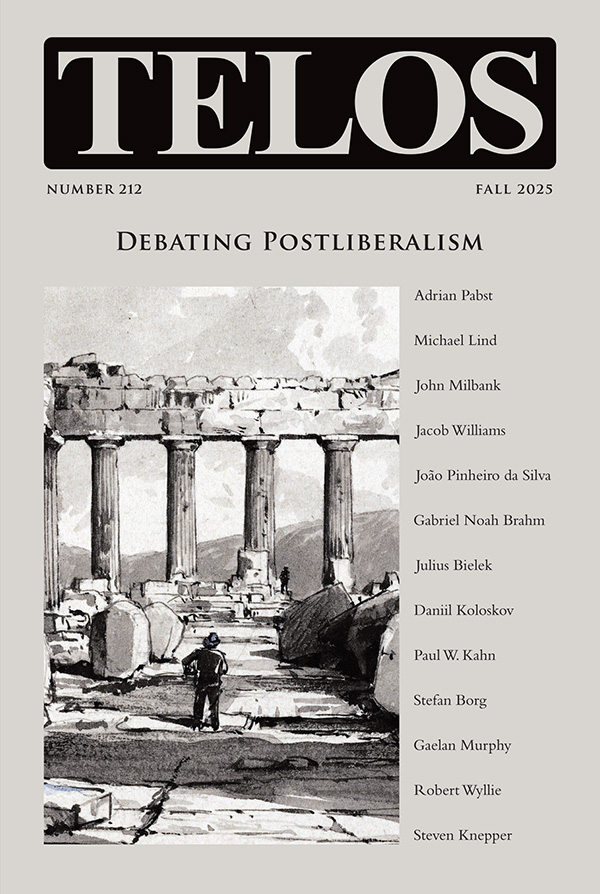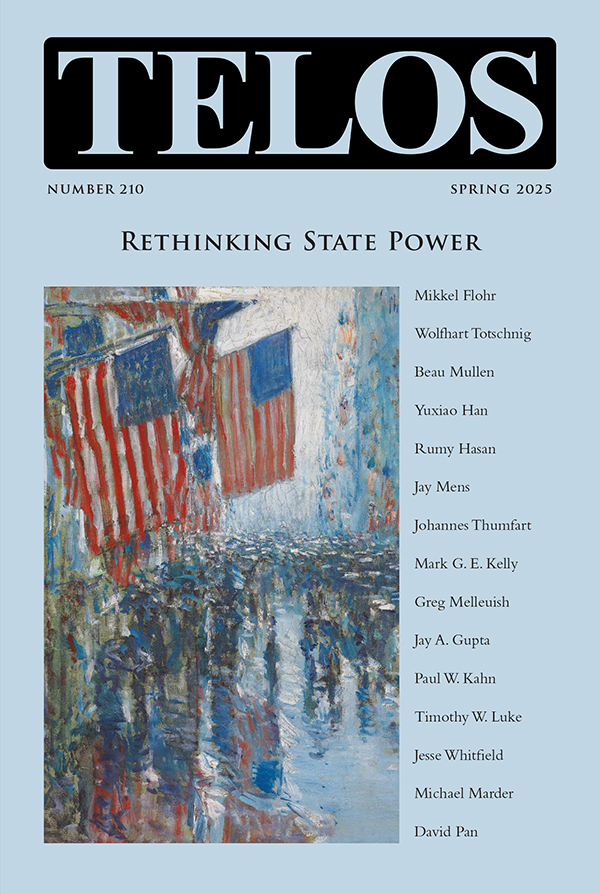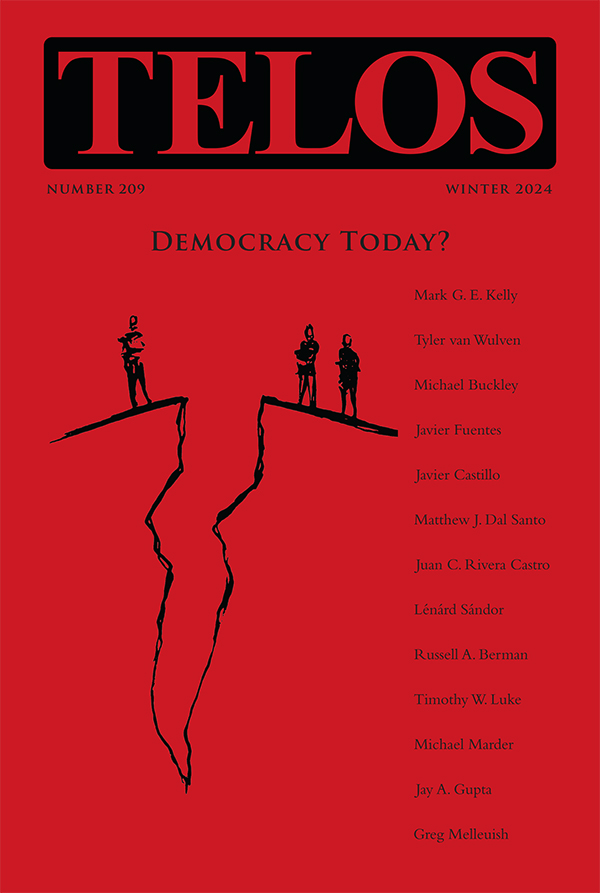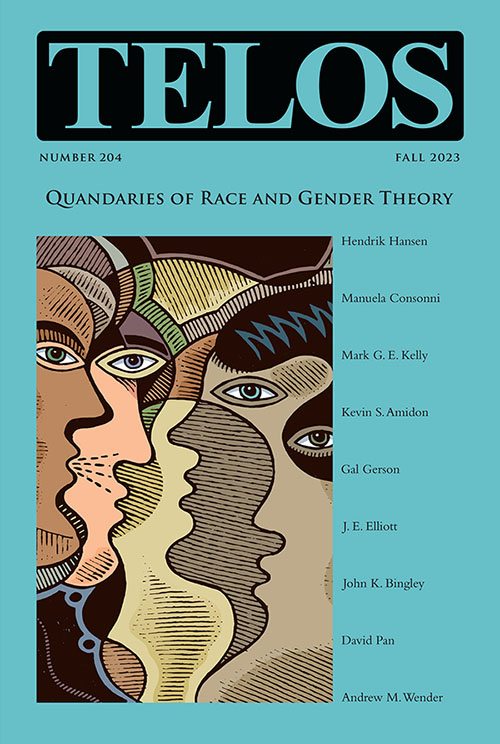By Adrian Pabst · Friday, October 3, 2025 Telos 212 (Fall 2025): Debating Postliberalism is now available for purchase in our store. Individual subscriptions to Telos are also available in both print and online formats.
 In 1998, Alan Wolfe remarked that “the right won the economic war, the left won the cultural war, and the center won the political war.” It was the age of triumphant liberalism, freed from the shackles of the Cold War confrontation between the capitalist West and the Communist East. Capitalism was now the uncontested model, as Western countries increasingly abandoned a more embedded social market economy in favor of the global market-state while emerging market economies embraced the state-market. In each case, society was the loser. Even as countries converged internationally and China morphed into an economic powerhouse, asset and income inequality increased within countries, and so did regional disparities—between the former heartlands of the Rust Belt and the new metropolitan hubs exemplified by Silicon Valley. Building on the writings of Paul Piccone and Christopher Lasch, critics of liberalism such as Christophe Guilluy, Nancy Fraser, Michael Lind, and Quinn Slobodian have highlighted the growing gulf between elite enclaves and peripheral wastelands, or hubs vs. heartlands, but their analysis has mostly been dismissed as nostalgic or downright reactionary. Something similar applies to politicians on both sides of the spectrum who have questioned liberal economics—whether Pat Buchanan in the past or JD Vance and Josh Hawley more recently on the Republican right, or Bernie Sanders, Ro Khanna, and Chris Murphy on the Democratic left. In 1998, Alan Wolfe remarked that “the right won the economic war, the left won the cultural war, and the center won the political war.” It was the age of triumphant liberalism, freed from the shackles of the Cold War confrontation between the capitalist West and the Communist East. Capitalism was now the uncontested model, as Western countries increasingly abandoned a more embedded social market economy in favor of the global market-state while emerging market economies embraced the state-market. In each case, society was the loser. Even as countries converged internationally and China morphed into an economic powerhouse, asset and income inequality increased within countries, and so did regional disparities—between the former heartlands of the Rust Belt and the new metropolitan hubs exemplified by Silicon Valley. Building on the writings of Paul Piccone and Christopher Lasch, critics of liberalism such as Christophe Guilluy, Nancy Fraser, Michael Lind, and Quinn Slobodian have highlighted the growing gulf between elite enclaves and peripheral wastelands, or hubs vs. heartlands, but their analysis has mostly been dismissed as nostalgic or downright reactionary. Something similar applies to politicians on both sides of the spectrum who have questioned liberal economics—whether Pat Buchanan in the past or JD Vance and Josh Hawley more recently on the Republican right, or Bernie Sanders, Ro Khanna, and Chris Murphy on the Democratic left.
Some political and policy differences notwithstanding, the mainstream left and right—in the United States, Europe, and other Western countries such as Japan, South Korea, Australia, and New Zealand—took a progressive turn and embraced untrammeled markets, hyper-individualism, and foreign military adventures. The ruling elites felt vindicated by the “end of history” utopia of a global convergence toward liberal market democracy and the inevitable forward march of globalization. Both liberal interventionists and neoconservative crusaders advanced the vision of America as a liberal Leviathan that secures the social contract at home and U.S. supremacy abroad.
Continue reading →
By David Pan · Monday, March 24, 2025 Telos 210 (Spring 2025): Rethinking State Power is now available for purchase in our store. Individual subscriptions to Telos are also available in both print and online formats.
 Frustrating the hopes of cosmopolitans and globalists, state power is back. Rather than imagining a replacement of sovereignty with law, political debates now revolve around the particular forms that state sovereignty might take. Even Europe, long seeing itself as the place from which a new international legal order might expand its reach, is reinvesting in military power to protect its sovereignty from the threats posed by Russia, China, and, in some ways, the United States. Yet this realization about the continuing centrality of the state does not mean an abandonment of the moral imperatives and prejudices of the people. On the contrary, state power is being recognized as the instrument through which the people can exercise their will, even as the state places constraints on popular sovereignty. The essays in this issue of Telos consider the ways in which state power interacts with popular attitudes and social institutions in order to establish the basis for sovereignty and law. Frustrating the hopes of cosmopolitans and globalists, state power is back. Rather than imagining a replacement of sovereignty with law, political debates now revolve around the particular forms that state sovereignty might take. Even Europe, long seeing itself as the place from which a new international legal order might expand its reach, is reinvesting in military power to protect its sovereignty from the threats posed by Russia, China, and, in some ways, the United States. Yet this realization about the continuing centrality of the state does not mean an abandonment of the moral imperatives and prejudices of the people. On the contrary, state power is being recognized as the instrument through which the people can exercise their will, even as the state places constraints on popular sovereignty. The essays in this issue of Telos consider the ways in which state power interacts with popular attitudes and social institutions in order to establish the basis for sovereignty and law.
Continue reading →
By David Pan · Monday, January 6, 2025 Telos 209 (Winter 2024): Democracy Today? is now available for purchase in our store. Individual subscriptions to Telos are also available in both print and online formats.
 Since the supposed triumph of liberal democracy with the end of the Cold War, democracy seems now to be in retreat. The hung parliaments in France and Germany, reminiscent of the divides of Germany’s Weimar Republic; the just-in-time reversal of the declaration of martial law in South Korea; the increasing authoritarianism of China, Iran, and Russia; and the deterioration of democratic norms in the United States are all indications that the liberal democratic end of history was a chimera. Since the supposed triumph of liberal democracy with the end of the Cold War, democracy seems now to be in retreat. The hung parliaments in France and Germany, reminiscent of the divides of Germany’s Weimar Republic; the just-in-time reversal of the declaration of martial law in South Korea; the increasing authoritarianism of China, Iran, and Russia; and the deterioration of democratic norms in the United States are all indications that the liberal democratic end of history was a chimera.
What is the situation of democracy today? Are the present problems simply growing pains in the inevitable march of history, or are there fundamental limitations of this political form? Is democracy a stable form of government or a delicate balancing act that will always be at risk of deteriorating and being replaced by some form of authoritarianism?
These current indications of the precarity of democracy also coincide, however, with an intense concern for its future. Never has there been such a focus on democracy as a political goal. During the Cold War, the United States, more concerned about promoting capitalism than defending democracy, supported capitalist authoritarianism in places such as Chile, South Korea, and Taiwan. But as it turned out, capitalism did not really need such political backing. In the Cold War between capitalism and communism, the latter lost based on its inability to produce economic growth. Insofar as communism’s undermining of private property and market mechanisms proved to be economically catastrophic, even nominally communist governments in China and Vietnam have since voluntarily embraced capitalist economic policies. Aside from U.S. college campuses, the only diehard Marxists left are in Cuba, North Korea, and Venezuela, all of whose governments are presiding over the immiseration of their peoples.
While it was the Soviet Union, and not capitalism, that collapsed under the weight of its own contradictions, the general recognition of these contradictions meant that communism could only maintain itself by using repressive methods. Communism has been one of the surest ways of moving toward and cementing authoritarianism and totalitarianism. By contrast, capitalist authoritarianism has sometimes led to democratic reforms, and we can point again to Chile, South Korea, and Taiwan, but also to the countries of Eastern Europe, as successful transitioners to democracy within a capitalist framework. Unfortunately, while communism might correlate strongly with authoritarianism, the link between capitalism and democracy does not seem to be so tight.
Continue reading →
By Antonio Lecuna · Tuesday, December 5, 2023 Argentina was among the wealthiest economies at the beginning of the twentieth century, according to the “Argentine Paradox” case study by Harvard Professor Rafael di Tella and New Change FX Chief Operations Officer Ingrid Vogel. The authors claim that under the global gold standard, international capital flooded into the country to exploit the unbounded investment opportunities. The economy maintained an average annual inflation rate of just 1.5 percent for fifty years after 1890. Parallel to low inflation, from 1900 to 1930, Argentina’s economy grew at an average annual rate of 4 percent—faster than the United States, Australia, or Canada. However, over the turn of the new millennium, Argentina no longer featured among the group of richest nations but rather languished toward the bottom of the middle-income group. This demise came despite the country’s natural resources and fertile land, the large flows of ambitious immigrants, and the high level of education. The political development of Argentina during this period had gone through several phases. Among the dominant figures were President Juan Domingo Perón and his charismatic wife Evita. Their populist policies had fundamentally shaped Argentina’s political, economic, and social evolution. Among the most notorious and devastating is a trade and economic policy that advocates replacing imports with domestic production known as industrialization through the substitution of imports. In addition to closing the economy to foreign trade mainly by increasing tariffs and quotas (including export tariffs), a variety of private companies and natural resources were nationalized.
Continue reading →
By Eric Hendriks · Monday, November 27, 2023 The PVV, the anti-Islam party of parliamentary veteran and avid Israel supporter Geert Wilders, overran the Dutch general election. Wilders’s mega victory, which the polls had not predicted, sent Dutch polite society into turmoil. Still, it has a certain logic, at least in retrospect. The last six weeks of the Dutch election season overlapped with the war between Israel and Hamas in Gaza and attendant Muslim and leftist protests in Europe and the Netherlands. The public focus on Islamist violence and Islamic culture war issues played into Wilders’s hands.
Continue reading →
By David Pan · Wednesday, October 18, 2023 Telos 204 (Fall 2023): Quandaries of Race and Gender Theory is now available for purchase in our store. Individual subscriptions to Telos are also available in both print and online formats.
 Old-style leftists have puzzled over how today’s left-liberals have abandoned traditional left-wing goals such as reducing class inequality and improving working-class standards of living. A key reason lies with the shifting of the politics of class. As Paul Piccone and Fred Siegel argued over thirty years ago in these pages, the problem of class is no longer a question of capitalists against workers. According to a recent Gallup poll, 61 percent of U.S. adults own stock, and such capitalist ownership, while a good way to increase wealth, is no longer the preserve of the ruling class and does not by itself confer much power. Rather, the ruling class that exercises real power consists not of owners but primarily of a bureaucratic class of managers in corporations, government, non-profits, universities, and the media. In spite of this shift, theories developed over a century ago continue to shape current leftist perspectives. Dominated by a socialist perspective, left-wing social policy fails to recognize and address the new contours of class division. As a result, it continues to employ a framework that is based on an anti-capitalist and anti-market agenda that tries to manipulate outcomes to promote socialist goals, precisely the methods of a managerial class. Old-style leftists have puzzled over how today’s left-liberals have abandoned traditional left-wing goals such as reducing class inequality and improving working-class standards of living. A key reason lies with the shifting of the politics of class. As Paul Piccone and Fred Siegel argued over thirty years ago in these pages, the problem of class is no longer a question of capitalists against workers. According to a recent Gallup poll, 61 percent of U.S. adults own stock, and such capitalist ownership, while a good way to increase wealth, is no longer the preserve of the ruling class and does not by itself confer much power. Rather, the ruling class that exercises real power consists not of owners but primarily of a bureaucratic class of managers in corporations, government, non-profits, universities, and the media. In spite of this shift, theories developed over a century ago continue to shape current leftist perspectives. Dominated by a socialist perspective, left-wing social policy fails to recognize and address the new contours of class division. As a result, it continues to employ a framework that is based on an anti-capitalist and anti-market agenda that tries to manipulate outcomes to promote socialist goals, precisely the methods of a managerial class.
Continue reading →
|
|
 In 1998, Alan Wolfe remarked that “the right won the economic war, the left won the cultural war, and the center won the political war.” It was the age of triumphant liberalism, freed from the shackles of the Cold War confrontation between the capitalist West and the Communist East. Capitalism was now the uncontested model, as Western countries increasingly abandoned a more embedded social market economy in favor of the global market-state while emerging market economies embraced the state-market. In each case, society was the loser. Even as countries converged internationally and China morphed into an economic powerhouse, asset and income inequality increased within countries, and so did regional disparities—between the former heartlands of the Rust Belt and the new metropolitan hubs exemplified by Silicon Valley. Building on the writings of Paul Piccone and Christopher Lasch, critics of liberalism such as Christophe Guilluy, Nancy Fraser, Michael Lind, and Quinn Slobodian have highlighted the growing gulf between elite enclaves and peripheral wastelands, or hubs vs. heartlands, but their analysis has mostly been dismissed as nostalgic or downright reactionary. Something similar applies to politicians on both sides of the spectrum who have questioned liberal economics—whether Pat Buchanan in the past or JD Vance and Josh Hawley more recently on the Republican right, or Bernie Sanders, Ro Khanna, and Chris Murphy on the Democratic left.
In 1998, Alan Wolfe remarked that “the right won the economic war, the left won the cultural war, and the center won the political war.” It was the age of triumphant liberalism, freed from the shackles of the Cold War confrontation between the capitalist West and the Communist East. Capitalism was now the uncontested model, as Western countries increasingly abandoned a more embedded social market economy in favor of the global market-state while emerging market economies embraced the state-market. In each case, society was the loser. Even as countries converged internationally and China morphed into an economic powerhouse, asset and income inequality increased within countries, and so did regional disparities—between the former heartlands of the Rust Belt and the new metropolitan hubs exemplified by Silicon Valley. Building on the writings of Paul Piccone and Christopher Lasch, critics of liberalism such as Christophe Guilluy, Nancy Fraser, Michael Lind, and Quinn Slobodian have highlighted the growing gulf between elite enclaves and peripheral wastelands, or hubs vs. heartlands, but their analysis has mostly been dismissed as nostalgic or downright reactionary. Something similar applies to politicians on both sides of the spectrum who have questioned liberal economics—whether Pat Buchanan in the past or JD Vance and Josh Hawley more recently on the Republican right, or Bernie Sanders, Ro Khanna, and Chris Murphy on the Democratic left. 




